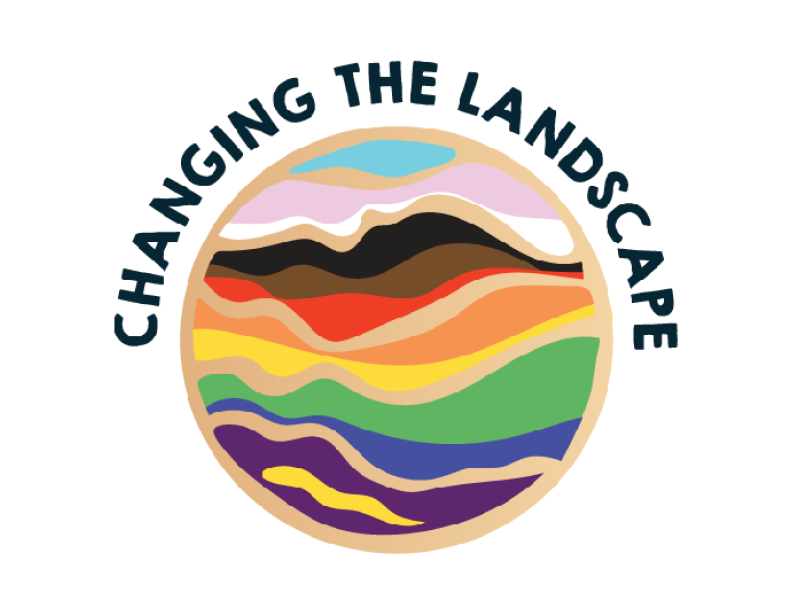The importance of LGBTIQA+SB* lived experience leadership in suicide prevention was the focus of a recent webinar the Changing the Landscape campaign held in partnership with Mind Australia.
Changing the Landscape is a project of Switchboard Victoria, generously funded by LGBTIQ+ Health Australia's Mindout Program. It seeks foundational changes that will have significant and enduring impact for LGBTIQA+SB people and communities toward the prevention of suicide, and improve the wellbeing of LGBTIQA+SB people impacted by suicide loss and those in our communities who provide care and support.
Mind was honoured that four of its key lived experience and LGBTIQA+ leaders were invited to share their insights. The webinar featured a discussion with Mind Executive Director Lived Experience Katie Larsen (she/they), Mind LGBTIQA+ Strategy and Service Development Manager Christopher ‘Cit’ Brett-Renes (they/them), Mind Lived Experience Workforce Partner Niharika Hiremath OAM (she/her) and LGBTIQA+ Aftercare Peer Practitioner Alex Cuffe (she/her).
The thought-provoking discussion explored LGBTIQA+SB leadership in suicide prevention and mental health, the role of organisations in driving change for communities, and what it means to embed LGBTIQA+SB* lived experience in suicide prevention at every level.
LGBTIQA+ lived experience at Mind
Katie Larsen discussed the origins of Mind’s LGBTIQA+ Aftercare program – an intensive outreach service that provides identity-affirmative support and care for LGBTIQA+ people who have experienced a suicidal crisis. Aftercare can provide up to three months of assistance by a mental health clinician and an LGBTIQA+ peer practitioner who acts as a ‘mentor’ or exemplar for recovery.
“When Aftercare started, there was a clear intention around the role of peer work and queer peer work and how that needed to be centred around the delivery of the program. Aftercare has been an extraordinary example of what you can do when you operate as much as possible through a community-led mindset. It’s critical that we continue to think about how we bring these types of models to life.
“When you operate grounded in justice and human rights, you’re able to create safe spaces for people to access services. We know that too often people from our community just don’t feel safe, they have a fear of how they will be received, and they feel invisible in conversations around distress and suicide.”
LGBTIQA+ peer work at Mind
Cit Brett-Renes said Mind’s approach to LGBTIQA+ peer work has adapted and grown over time. The staff training and professional development have responded to the needs of service users based on their feedback and experience.
“What we’ve done successfully over the past 18 months is bring the philosophy of peer practice to our Allied Health space. Our Allied Health team, and all of our Aftercare team, is intentionally peer support trained. That training alone sets the bedrock from which the program gets its values and mission and how we approach the work,” they said.
“The other thing we’ve done is actively understand what brings people to Aftercare. We understand mental health is one aspect, but there are other things going on too. Through intake assessments and surveys we have been able to get a great picture of the intersectionalities that impact people and we’ve been able to better respond and adapt as a service.”
What peer-led support means for service users
Alex Cuffe is a qualified peer worker at Mind’s Aftercare program who is trained to use her lived experience of mental health challenges to support others. She is also a qualified counsellor, but above all of her education, training and knowledge as a mental health practitioner, the most impactful quality Alex brings to her work supporting LGBTIQA+ people is visibility.
“There aren’t any bells and whistles to the work, but just sitting next to someone and listening. [As a service user] you know when someone has been through something, and you can tell instantly whether or not they [support workers] are pulling the wool over your eyes,” Alex said.
“The amount of young people in particular who have said ‘you don’t know how significant it is just to sit with you’. It’s single-handily the most reported thing I hear. It’s very simple but you can’t go past how important visibility is for community.”
Investing in lived experience leadership and sharing the load
Niharika Hiremath’s role at Mind sees her use her own lived experience and expertise, and cultural and intersectional perspectives, to inform a deeper understanding of how the mental health system can and should operate. She says mental health and suicide prevention services need to better support and invest in peer leaders, so that they and future leaders can continue to carry out this work sustainably.
“There’s a lot of lip service in this space and often service providers claim they are doing what they believe in and what they say they are passionate about. But in the context of actually being able to bolster peer leadership and do it sustainably over a period of time, providers need to put their money, energy and intent where their mouth is. When you start doing and investing in peer leadership with purpose is when things will start to change,” she said.
“Our communities need to work themselves to the bone, specifically those folks that are leading their communities. It has been difficult to watch people not be seen or heard, specifically those who put themselves on the line. Service providers need to start upping their game and investing more in peer leadership.”
Click here to watch the full discussion with Changing the Landscape.
*Changing the Landscape use the acronym LGBTIQA+SB which stands for Lesbian, Gay, Bi, Transgender, Intersex, Queer, Asexual, Sistergirl, Brotherboy +. The SB acknowledges the trans women and trans men within many Aboriginal and Torres Strait Islander communities.
